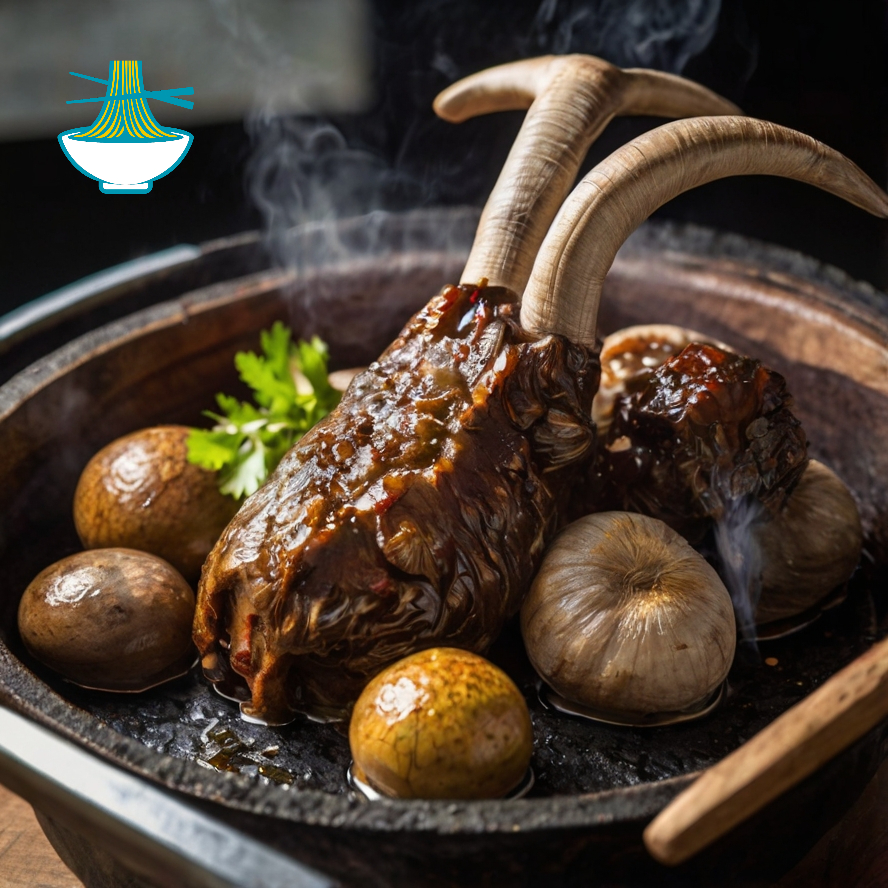Discover how to make succulent slow-cooked mutton shanks with this easy recipe. Learn the secrets to achieving perfectly tender meat, and enjoy a hearty meal featuring mutton shanks simmered with potatoes and vegetables. Ideal for a comforting dinner, this recipe will guide you through every step, from seasoning to cooking. Perfect for family gatherings or a special occasion.
Ingredients:
- 4 mutton shanks
- 2 tablespoons vegetable oil
- 1 large onion, chopped
- 3 cloves garlic, minced
- 2 carrots, sliced
- 2 potatoes, peeled and diced
- 1 cup celery, sliced
- 2 cups beef or vegetable broth
- 1 cup red wine (optional)
- 1 tablespoon tomato paste
- 1 teaspoon dried thyme
- 1 teaspoon dried rosemary
- 1 bay leaf
- Salt and black pepper to taste
- Fresh parsley for garnish
Instructions:
Prepare the Shanks: Pat the mutton shanks dry with paper towels. Season generously with salt and black pepper.
Sear the Meat: Heat the vegetable oil in a large pot or Dutch oven over medium-high heat. Add the mutton shanks and sear on all sides until browned. Remove the shanks from the pot and set aside.
Sauté Vegetables: In the same pot, add the chopped onion and cook until translucent, about 5 minutes. Add the garlic and cook for another minute until fragrant.
Add Vegetables and Seasoning: Stir in the sliced carrots, diced potatoes, and celery. Cook for a few minutes, then add the tomato paste, thyme, rosemary, and bay leaf. Mix well.
Deglaze and Simmer: Pour in the broth and red wine (if using), stirring to deglaze the pot and lift any browned bits from the bottom. Return the mutton shanks to the pot.
Slow Cook: Bring the mixture to a boil, then reduce the heat to low. Cover and let it simmer for 2.5 to 3 hours, or until the mutton shanks are tender and easily fall off the bone.
Serve: Remove the bay leaf. Adjust seasoning with salt and pepper to taste. Garnish with fresh parsley before serving.
Enjoy your delicious slow-cooked mutton shanks with a side of crusty bread or over a bed of rice for a complete meal!
Nutritional Value
Mutton Shanks
- Calories: 250-300 kcal
- Protein: 20-25g
- Fat: 20-25g
- Iron: 2-3mg
Benefits: High in protein and iron, which are essential for muscle growth and maintaining healthy blood levels. Mutton also provides vitamins such as B12.
Vegetable Oil
- Calories: 120 kcal
- Fat: 14g (of which 2g is saturated)
Benefits: Provides essential fatty acids and helps with the absorption of fat-soluble vitamins (A, D, E, K). Choose oils high in unsaturated fats for heart health.
Large Onion
- Calories: 40 kcal
- Protein: 1g
- Carbohydrates: 9g
- Fiber: 2g
Benefits: Rich in antioxidants and sulfur compounds, which may help reduce inflammation and support heart health. Onions are also a good source of vitamin C.
Garlic
- Calories: 4 kcal
- Protein: 0.2g
- Carbohydrates: 1g
Benefits: Contains compounds like allicin that may support immune function and cardiovascular health. Garlic has been linked to reduced blood pressure and cholesterol levels.
Carrots
- Calories: 41 kcal
- Protein: 0.9g
- Carbohydrates: 10g
- Fiber: 3g
Benefits: High in beta-carotene, which is converted to vitamin A in the body. This supports vision health and immune function. Carrots also have antioxidants and fiber.
Potatoes
- Calories: 77 kcal
- Protein: 2g
- Carbohydrates: 17g
- Fiber: 2g
Benefits: Good source of vitamins B6 and C, potassium, and dietary fiber. Potatoes provide energy and help in maintaining heart health.
Celery
- Calories: 16 kcal
- Protein: 0.7g
- Carbohydrates: 3g
- Fiber: 1.6g
Benefits: Low in calories and high in water content. Celery contains vitamins A, C, and K, as well as potassium. It supports hydration and digestive health.
Beef or Vegetable Broth
- Beef Broth: Approximately 40-50 kcal
- Vegetable Broth: Approximately 15-20 kcal
Benefits: Adds flavor and can provide some vitamins and minerals, depending on the ingredients used. Broth is often used to enhance the flavor of dishes without adding significant calories.
Red Wine (Optional)
- Calories: 85 kcal
- Carbohydrates: 2g
Benefits: Contains antioxidants such as resveratrol, which may have heart health benefits. However, alcohol should be consumed in moderation due to its caloric content and potential health risks.
Tomato Paste
- Calories: 13 kcal
- Carbohydrates: 3g
Benefits: Concentrated source of lycopene, an antioxidant that may help reduce the risk of certain cancers and support heart health.
Dried Thyme
- Calories: 1 kcal
- Carbohydrates: 0.3g
Benefits: Contains vitamins A and C, iron, and antioxidants. Thyme has antimicrobial properties and can aid in digestion.
Dried Rosemary
- Calories: 2 kcal
- Carbohydrates: 0.5g
Benefits: Rich in antioxidants and has anti-inflammatory properties. Rosemary may help improve digestion and memory.
Bay Leaf
- Calories: 1 kcal
- Carbohydrates: 0.3g
Benefits: Contains antioxidants and has antimicrobial properties. Bay leaves are often used for flavor rather than nutritional value.
Salt and Black Pepper
- Sodium: 2300mg (100% DV)
Benefits: Salt is essential for fluid balance and nerve function, but excessive consumption can lead to health issues.
Black Pepper (per teaspoon):
- Calories: 6 kcal
- Carbohydrates: 1.5g
Benefits: Contains piperine, which may aid digestion and enhance nutrient absorption.
Fresh Parsley
- Calories: 1 kcal
- Carbohydrates: 0.2g
Benefits: Rich in vitamins A, C, and K. Parsley has antioxidant properties and may support digestion and kidney function.
This combination of ingredients will provide a hearty and nutritious dish with a variety of vitamins, minerals, and beneficial compounds.


Comments